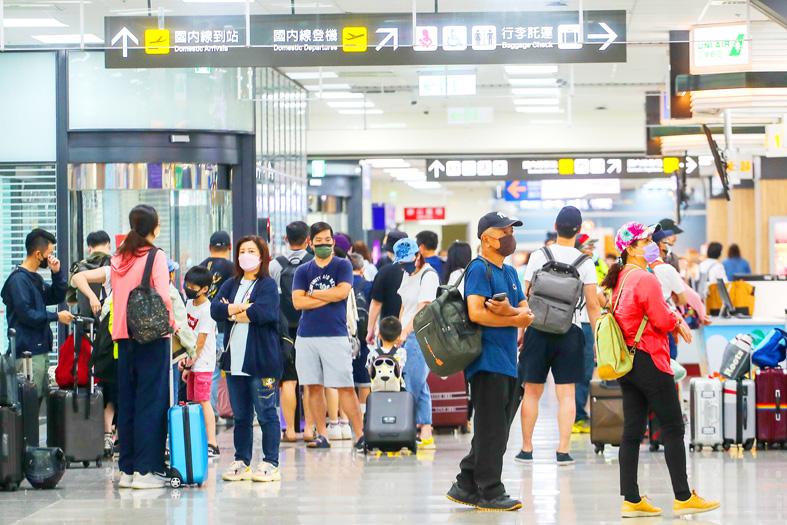Nearly 60 percent of Taiwanese would travel abroad despite higher travel costs and about 80 percent would likely accept an increase of travel expenses of up to 25 percent, a MasterCard Taiwan (萬事達) survey showed yesterday.
Eleven percent of those polled said they would refrain from traveling overseas given the rising travel costs and 23 percent said they would travel domestically within the next year due to the COVID-19 situation and border control measures to curb the spread of the disease, the survey showed.
Japan was the most popular overseas destination, followed by South Korea, Southeast Asia and Europe, it showed.

Photo: CNA
The survey collected answers from 1,000 people aged 20 to 65. It was held from June 3 to 11.
MasterCard Taiwan said that the COVID-19 pandemic has changed people’s attitude toward travel.
Regardless of age, Taiwanese have become less interested in participating in group tours and are looking to travel alone or with friends instead, the survey showed.
Those aged 20 to 30 are least interested in group tours compared with other age groups, it showed.
The survey showed that people pay more attention to social distancing than before the pandemic.
It showed that 58 percent would prefer direct flights or traveling in their own vehicle, while 36 percent preferred independent accommodation over shared accommodation.
MasterCard Taiwan said it would update the benefits for holders of World MasterCards and begin offering travel insurance including medical coverage for people who contract COVID-19 overseas.

ISSUES: Gogoro has been struggling with ballooning losses and was recently embroiled in alleged subsidy fraud, using Chinese-made components instead of locally made parts Gogoro Inc (睿能創意), the nation’s biggest electric scooter maker, yesterday said that its chairman and CEO Horace Luke (陸學森) has resigned amid chronic losses and probes into the company’s alleged involvement in subsidy fraud. The board of directors nominated Reuntex Group (潤泰集團) general counsel Tamon Tseng (曾夢達) as the company’s new chairman, Gogoro said in a statement. Ruentex is Gogoro’s biggest stakeholder. Gogoro Taiwan general manager Henry Chiang (姜家煒) is to serve as acting CEO during the interim period, the statement said. Luke’s departure came as a bombshell yesterday. As a company founder, he has played a key role in pushing for the

China has claimed a breakthrough in developing homegrown chipmaking equipment, an important step in overcoming US sanctions designed to thwart Beijing’s semiconductor goals. State-linked organizations are advised to use a new laser-based immersion lithography machine with a resolution of 65 nanometers or better, the Chinese Ministry of Industry and Information Technology (MIIT) said in an announcement this month. Although the note does not specify the supplier, the spec marks a significant step up from the previous most advanced indigenous equipment — developed by Shanghai Micro Electronics Equipment Group Co (SMEE, 上海微電子) — which stood at about 90 nanometers. MIIT’s claimed advances last

CROSS-STRAIT TENSIONS: The US company could switch orders from TSMC to alternative suppliers, but that would lower chip quality, CEO Jensen Huang said Nvidia Corp CEO Jensen Huang (黃仁勳), whose products have become the hottest commodity in the technology world, on Wednesday said that the scramble for a limited amount of supply has frustrated some customers and raised tensions. “The demand on it is so great, and everyone wants to be first and everyone wants to be most,” he told the audience at a Goldman Sachs Group Inc technology conference in San Francisco. “We probably have more emotional customers today. Deservedly so. It’s tense. We’re trying to do the best we can.” Huang’s company is experiencing strong demand for its latest generation of chips, called

EUROPE ON HOLD: Among a flurry of announcements, Intel said it would postpone new factories in Germany and Poland, but remains committed to its US expansion Intel Corp chief executive officer Pat Gelsinger has landed Amazon.com Inc’s Amazon Web Services (AWS) as a customer for the company’s manufacturing business, potentially bringing work to new plants under construction in the US and boosting his efforts to turn around the embattled chipmaker. Intel and AWS are to coinvest in a custom semiconductor for artificial intelligence computing — what is known as a fabric chip — in a “multiyear, multibillion-dollar framework,” Intel said in a statement on Monday. The work would rely on Intel’s 18A process, an advanced chipmaking technology. Intel shares rose more than 8 percent in late trading after the